人教版八年级英语上册讲学稿unit3
【人教版】新目标八年级英语上册:Unit 3 单元说课稿(2)
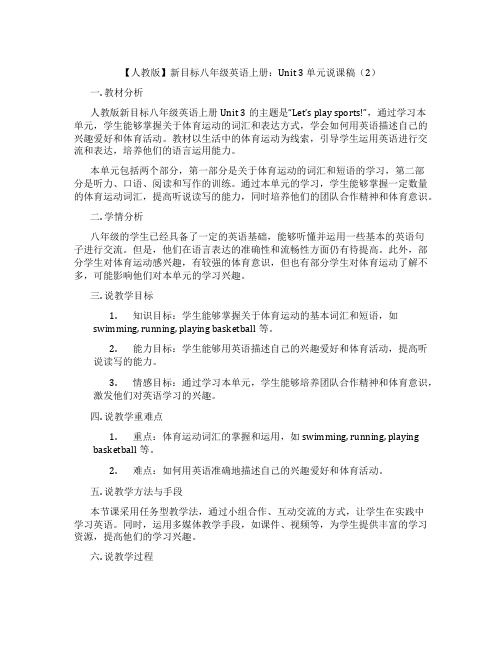
【人教版】新目标八年级英语上册:Unit 3 单元说课稿(2)一. 教材分析人教版新目标八年级英语上册Unit 3的主题是“Let’s play sports!”,通过学习本单元,学生能够掌握关于体育运动的词汇和表达方式,学会如何用英语描述自己的兴趣爱好和体育活动。
教材以生活中的体育运动为线索,引导学生运用英语进行交流和表达,培养他们的语言运用能力。
本单元包括两个部分,第一部分是关于体育运动的词汇和短语的学习,第二部分是听力、口语、阅读和写作的训练。
通过本单元的学习,学生能够掌握一定数量的体育运动词汇,提高听说读写的能力,同时培养他们的团队合作精神和体育意识。
二. 学情分析八年级的学生已经具备了一定的英语基础,能够听懂并运用一些基本的英语句子进行交流。
但是,他们在语言表达的准确性和流畅性方面仍有待提高。
此外,部分学生对体育运动感兴趣,有较强的体育意识,但也有部分学生对体育运动了解不多,可能影响他们对本单元的学习兴趣。
三. 说教学目标1.知识目标:学生能够掌握关于体育运动的基本词汇和短语,如swimming, running, playing basketball等。
2.能力目标:学生能够用英语描述自己的兴趣爱好和体育活动,提高听说读写的能力。
3.情感目标:通过学习本单元,学生能够培养团队合作精神和体育意识,激发他们对英语学习的兴趣。
四. 说教学重难点1.重点:体育运动词汇的掌握和运用,如swimming, running, playingbasketball等。
2.难点:如何用英语准确地描述自己的兴趣爱好和体育活动。
五. 说教学方法与手段本节课采用任务型教学法,通过小组合作、互动交流的方式,让学生在实践中学习英语。
同时,运用多媒体教学手段,如课件、视频等,为学生提供丰富的学习资源,提高他们的学习兴趣。
六. 说教学过程1.热身(5分钟):引导学生进行简单的体育活动,如跑步、跳绳等,激发学生的体育兴趣。
人教版英语八上第三单元说课稿范文

人教版英语八上第三单元说课稿范文The third unit of English in the eighth grade of People's Education Press focuses on the theme of "Travel". 这本教材的第三单元关注的主题是“旅行”。
In this unit, students will learn vocabulary related to travel, such as modes of transportation, tourist attractions, and travel activities. 在这个单元里,学生们将学习与旅行相关的词汇,比如交通工具、旅游景点和旅行活动。
One of the key language points in this unit is the use of comparative and superlative adjectives to describe different travel experiences. 这个单元的一个关键语言点是使用比较级和最高级形容词来描述不同的旅行经历。
Through a variety of activities, exercises, and listening tasks, students will have the opportunity to practice using these language points in context. 通过各种各样的活动、练习和听力任务,学生们将有机会在实际情境中练习使用这些语言要点。
Furthermore, this unit incorporates cultural aspects of travel, exposing students to different customs, traditions, and tourist destinations around the world. 此外,本单元融入了旅行的文化方面,让学生了解世界各地的不同风俗、传统和旅游目的地。
英语知识点-八年级英语上册unit3说课稿人教版【精选教案】

Unit 3 What are you doing for vocation ?Section A 说课稿Unit 3 What are you doing for vocation ?Section A 说课稿李涛一、本课时教学设计的教学理念和特点本课是我在开学初期学校安排领导示范课活动中的一堂课,下面就我对本课的一点认识向大家简单介绍一下。
首先,教学要面向全体学生,要有利于各种层次的学生参与和发展。
通过合作交流,要发展同性,更要注意保持个性。
对于一幅图,每个同学都有不同的看法或表达法,教师要尽量给他们机会互相交流,互相促进。
注意设计一些“弹性”大的任务和问题。
从一个词,到几句话,从一个表情到一系列表演,使任何学生都有话可说,有事可做。
要做好这一点,教师不但要布置任务,更要帮助学生完成任务。
如,学生在描述本活动的几幅图时,教师要提供给学生一些思考问题的方法及新的表达法或词语。
因为这样的学习是主动的,会收到较好的效果,第二,注意挖掘潜能,为学生的综合能力发展搭设平台。
看图说话可促进听说能力的发展。
这一发展会使学生产生更大的学习信心和动力。
以此活动为切入点,布置一些后续任务还可促进学生表演、写作等多元智能的发展。
第三,设计本课时教学时,我们还十分注意英语学科教学与德育渗透及情感教育的原则。
我们以vocation(假期)为线索,既对学生进行英语能力的培养,又对学生进行尊老爱幼、互相帮助和助人为乐的道德情感教育。
其方式贴切、自然,犹如春雨入土,润物细无声。
第四,注意本看图说话的教学设计可操作性强、适应面广。
1)其故事可以用现在时态叙述,也可以用过去时态叙述;2)适其学生水平,教师既可用英语,也可用汉语布置任务;3)媒体手段简单、实用、可操作性和适用性强。
本课时媒体即可以用现代手段,也以可用传统方法。
如,六幅图即可以用幻灯投影,也可以自己画图或用简笔画展示。
对教师口头布置的任务、所问问题以及重要讲述都有中英文字幕显示。
人教版英语八年级上册Unit3单元整体说课稿
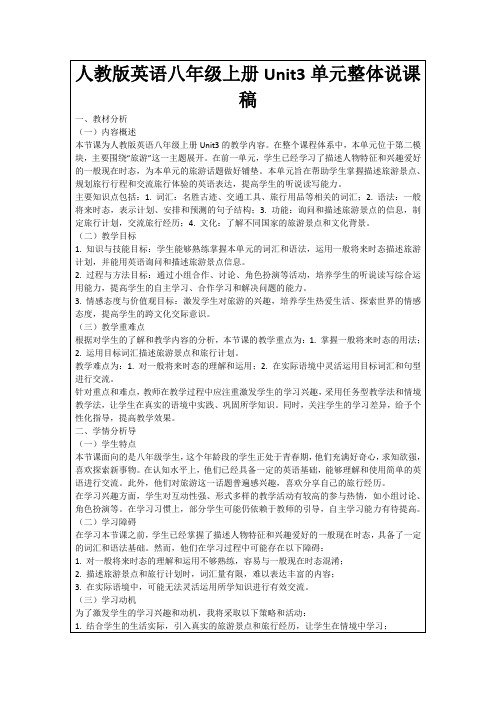
作业的目的是巩固所学知识,提高学生的自主学习能力,培养他们的写作和表达能力。同时,通过预习,使学生养成良好的学习习惯,为下一节课的学习打下基础。
五、板书设计与教学反思
(一)板书设计
我的板书设计将采用结构化的布局,主要内容分为三部分:左侧列出本节课的主要词汇和短语,中间展示一般将来时态的语法结构和关键句型,右侧则用于记录旅行计划的制定步骤和示例对话。板书风格将简洁明了,使用不同颜色的粉笔突出重点,使知识结构一目了然。
3.评价环节:学生互评,提出改进建议,促进同伴间的相互学习和提高;教师评价,给予肯定和鼓励,提高学生的自信心。
四、教学过程设计
(一)导入新课
为快速吸引学生的注意力和兴趣,我将采用以下方式导入新课:
1.利用多媒体展示世界各地著名的旅游景点图片,让学生猜测并说出景点的名称;
2.邀请学生分享自己的旅行经历,谈谈他们对旅游的看法和期待;
3.创设情境,告知学生我们将要学习如何用英语制定旅行计划,激发学生的好奇心和求知欲。
(二)新知讲授
在新知讲授阶段,我将逐步呈现知识点,引导学生深入理解:
1.通过图片、例句等形式引入本节课的词汇,让学生在语境中理解和记忆;
2.结合实际旅行场景,讲解一般将来时态的用法,并通过示例句和练习,让学生掌握其结构;
(三)互动方式
我将设计以下师生互动和生生互动环节,以促进学生的参与和合作:
1.师生互动:教师提问,学生回答,教师给予反馈,引导学生深入思考;教师示范,学生模仿,教师及时纠正发音和语法错误;
2.生生互动:小组合作,共同完成旅行计划表,讨论旅游景点,互相提问和解答;角色扮演,模拟旅行场景,进行英语对话;
2.过程与方法目标:通过小组合作、讨论、角色扮演等活动,培养学生的听说读写综合运用能力,提高学生的自主学习、合作学习和解决问题的能力。
人教版八年级英语上册讲学稿unit3

Unit 3 What are you doing for vacation?(Period 1)课型:新授主备:陈宝娟审核:班级:姓名:时间:学习目标:1.讨论未来计划;2.进行时态表示计划或安排将要发生的动作.课前准备:1.识记本课新单词;2.预习并完成1a.3.翻译并熟记下列短语:去游泳去钓鱼多长时间去野营 on Monday next week4.讨论预习中存在的问题.课前检测:1.用适当的形式填空:1) Are you (go) for a trip to the seaside?2) The shoes are too dirty, I’m going to (清洗) them.3) (get) up or we’ll be late for class.4) They are going to do some (shop).疑难摘录__________________________________________________________________________ ___________________________________________________学习过程:1.师生交流,探究预习中存在的问题.2.找出本节课的重要句型:3.听录音,完成1b,2a和2b.4.读下列对话,探讨并总结:-What are you doing for vacation? -I’m visiting my grandmother.-When are you going? -I’m going on Monday.上述句子都是时态,其结构为,由部分构成,谈论计划.5.双人进行下列对话练习,并编写新对话.A: What are you doing for vacation?B: I’m going camping.A: That sounds nice. Who are you going with?B: I’m going with my parents.A:B:A:B:课堂检测:1.按要求变换下列单词:visit(名词) shop(现在分词) it(复数)family(复数) hear(同音词) mine(主格)five(序数词) a re not(缩写)2.根据答语,补充问句:1) for vacation?We’re going swimming.2) for vacation?She’s visiting her grandparents.3) ?He’s going on September 10th.4) ?They are going home next week.5) ?I’m going camping with my friends.3.连词成句1)do ,on , you, what, weekends, usually, do, ?__________________________________________________2) often, Cheng, TV, how, does , watch, ?____________________________________________________3)matter, you , what, is, the, with?_____________________________________________________ 错题集____________________________________________________________________ _________________________________________ ________________(学)教后记_____________________________________________________________________________________________________________________________Unit 3 What are you doing for vacation?(Period 2)课型:新授主备:陈宝娟审核:班级:姓名:时间:学习目标:1.复习正在进行时态并正确运用;2.识记本课重要单词和短语:课前准备:1.复习现在进行时态;2.预习3a,并完成数据.课前检测:根据句意及汉语提示完成句子.1) Linda is (临时照顾) her little brother.2) The boys went (野营) last year.3) What are you doing for (假期).4) Hong Kong (回归) to China in 1997.5) How about (去散步)?疑难摘录__________________________________________________________________________ ___________________________________________________教学过程:1.师生共同探究预习中存在的问题.2.双人分角色练习对话3a,3b.其中:(1) I’m going hiking in the mountains. 我要去山里远足. go hiking “去远足”,“go+动词的-ing形式”,表示体育运动或娱乐消遣,类似的短语有:go fishing 去钓鱼go sightseeing去观光,游览go skating 去滑冰(2) That sounds nice. 那听起来很好. sound 在句中作连系动词,后面跟形容词、名词、介词短语作表语. 例如:The song sounds wonderful. 那首歌听起来美妙动听.That sounds a good idea. 那听起来是一个好主意.(3) How long is he staying? 他将待多久?how long 意为“多久,多长”,用来询问一段时间. 例如:还可用于询问物体的长度. 例如:How long is the ruler?课堂检测:1.单项填空:( ) 1. are you going for summer vacation?A. WhatB. WhenC. WhereD. How( ) 2. –Who are you going ? –My mother.A. toB. withC. forD. at( ) 3. He’s for Beijing next week.A. leaveB. to leaveC. leavesD. leaving( ) 4. You’d better a rest when you finish it.A. haveB. to haveC. havingD. had( ) 5. Would you like with us tomorrow?A. goB. to goC. goingD. went( ) 6. What is she doing vacation?A. inB. withC. atD. for( ) 7. We are going to Beijing July I7.A. inB. onC. atD. for( ) 8. –do you do sports every day?–About two hours.A. How longB. How oftenC. How muchD. How( ) 9. This music beautiful.A. listensB. hearsC. soundsD. are( ) 10. The tourists should take with them.A. something necessaryB. necessary somethingC. necessary everythingD. anything necessary2.句型转换.1.I’m going to stay in America for a year.(对画线部分提问)are you going to stay in America?2.How is the weather in Lanzhou?(同义句转换)is the weather in Lanzhou?3.I go to see the dentist twice a year.(对画线部分提问)do you go to see the dentist.4. When did you return from your vacation? (同义句)When did you from your vacation?5. She is babysitting her sister. (同义句转换)She is her sister.错题集____________________________________________________________________ _________________________________________ ________________(学)教后记_____________________________________________________________________ ________________________________________________________Unit 3 What are you doing for vacation?(Period 3)课型:新授主备:陈宝娟审核:班级:姓名:时间:学习目标:1.学会制定度假计划,2.正确使用现在进行时表将来,.3.区别现在进行时表将来与be going to表将来,4. 重要词语:take a vacation / vacations, go camping, go fishing.课前准备:1.识记新单词;2.预习并完成section B 中的1a;3.预习2c,注意句子时态. 课前检测:单项选择:1. What are you this weekend?A. doB. goingC. to do2. are you talking with?A. WhoB. who’sC. Whose3. His plan very interesting.A. looksB. soundsC. hears4. She is going to the classroom English books.A. to readB. readingC. reads5. I’ll write to you as soon as I to school.A. goB. goingC. to go疑难摘录__________________________________________________________________________ ___________________________________________________学习过程:1.预习情况交流,共同探讨存在的问题.2.听对话,完成2a,2b.3.读句子,探讨并总结:1) Ben Lambert, the famous French singer is taking a long vacation this summer. 法国著名歌星Ben Lambert在这个夏季要休一个长假.the famous French singer在这句话中作Ben Lambert的同位语,是对它的一个补充说明,对整个句子的时态没有任何影响. 例如:Zhang chaoyang, the CEO of Sohu Company, told the reporters yesterday that company would have a big change this year. 搜狐总裁张朝阳于昨日向记者发表声明,搜狐公司今年将有一个很大的转变.2) I hope I can forget all my problem. 我希望能忘记所有的烦恼.hope 作及物动词,表示“希望”,其后可跟不定式作宾语. 例如:I hope to see you soon;若要表示“希望别人做某事”,则后需跟宾语从句. 例如:I hope that you have a good time.forget用于forget to do sth. 中,表示“忘记要做某事”,但forget doing sth表示“忘记做过了某事”. 例如:I forget to post the letter. (忘了要把信寄出) I forget posting the letter. (忘了把信寄出了)课堂检测:1.补全对话。
人教版英语八上第三单元说课稿范文

人教版英语八上第三单元说课稿范文全文共3篇示例,供读者参考篇1Unit 3: A Better Future for the EarthLesson PlanIntroduction (200 words)What's up, everyone? It's time to talk about Unit 3 - A Better Future for the Earth. This unit is all about environmental protection and sustainable development. As students in the 8th grade, we've been learning about the environment and climate change for years now. But this unit really dives deep into the issues and explores ways we can create a better, greener future for our planet.Personally, I find this topic super interesting and important. Climate change is one of the biggest challenges facing humanity, and we need to take action now to protect the Earth for future generations. This unit will teach us about the causes of environmental problems like pollution, deforestation, and waste. But it also shows us ways to reduce our carbon footprint and live more sustainably.I'm really excited to learn some new English vocabulary and expressions related to the environment. It will be great to discuss these critical issues in English and get an international perspective. I'm curious to see what solutions are proposed and how people in different countries are working towards sustainability. With the knowledge from this unit, I hope we can all become more environmentally conscious and do our part to create positive change.Section 1: Causes of Environmental Problems (500 words)The first part of Unit 3 focuses on understanding the root causes behind major environmental issues like air pollution, water contamination, habitat destruction, and resource depletion. We'll learn lots of relevant vocabulary like "emissions," "deforestation," "fossil fuels," and "greenhouse gases."One of the key readings is about the growth of cities and urban sprawl. With more and more people moving to cities, there is increasing demand for housing, transportation, energy, and resources. If this urban development is not well-planned and eco-friendly, it can seriously damage the environment through air pollution from vehicles, destruction of green spaces, overuse of water resources, and production of excess waste.We'll also look at the environmental impact of farming, manufacturing, mining, and other human activities. Certain agricultural practices like overuse of pesticides and fertilizers can contaminate soil and water systems. Factories that improperly handle chemicals and waste products are a major source of pollution. And extractive industries like mining, drilling, and logging are responsible for widespread habitat loss.Another major focus will be on overconsumption,non-sustainable use of resources, and our throwaway culture. We'll learn about the massive amounts of waste produced by excessive packaging, food waste, fast fashion, single-use plastics, and electronic waste. It's pretty shocking to see the statistics on how much reusable material ends up in landfills and oceans each year.The readings also cover rapid population growth as a driving factor behind many environmental problems. With more people on the planet consuming resources and producing waste, the strains on the environment increase exponentially unless we embrace sustainable policies and technologies.Throughout this section, we'll discuss and debate the roles that governments, corporations, and individuals play in causing or preventing environmental destruction. There's plenty of roomfor critical thinking about shared responsibilities and accountability.Section 2: Solutions and Sustainable Living (700 words)Okay, so we learned about all the environmental problems humans have caused through our unsustainable modern lifestyles and overexploitation of natural resources. That was pretty heavy stuff - I know I felt kind of overwhelmed by all the gloom and doom statistics on extinction rates, ice cap melting, and pollution levels.But don't lose hope yet! The second half of Unit 3 is all about solutions for protecting the environment and working towards sustainability. We'll learn about the latest clean energy technologies like solar, wind, geothermal, and nuclear power. We'll explore sustainable architecture and urban design that minimizes environmental impact. And we'll discuss economic and political policies aimed at conservation and combating climate change.One of the coolest parts is when we get to learn about real individuals, companies, and countries that are pioneers in environmental protection and sustainability. From teenage activists and non-profit organizations, to green tech startups andnation-leading sustainable initiatives, it's inspiring to see how many people are working hard to create a better future.We'll learn tons of useful vocabulary for talking about environmental solutions like "renewable energy," "carbon neutral," "reforestation," "eco-friendly," "sustainable agriculture," "conservation efforts," and "recycling initiatives." Understanding this green terminology will allow us to communicate more effectively about important environmental issues.A big focus will be on how we can apply these sustainable practices to our own lives and reduce our personal carbon footprints. We'll calculate our environmental impact and learn simple ways to live greener through actions like:Reducing consumption and wasteReusing and recycling materialsEating more plant-based foodsUsing renewable energy sourcesWalking, biking or taking public transitConserving water and electricityWe'll get plenty of practical advice for making our homes, schools, and communities more eco-friendly through sustainablelifestyle changes. Even small individual actions can collectively make a big positive impact when multiplied across the whole society.The readings also emphasize the importance of civic engagement and activism in pushing for pro-environment policies, corporate responsibility, investment in green technology, and international cooperation on climate issues. We'll learn how to effectively raise awareness, voice our concerns, and demand action from leaders and decision-makers.As young people, we have a huge stake in environmental protection since we'll be dealing with the consequences for decades to come. This unit will empower us with the knowledge and communication skills to be part of the solution in creating a sustainable future for our planet.Conclusion (200 words)By the end of Unit 3, we'll have a comprehensive understanding of major environmental threats like climate change, pollution, habitat loss, and resource depletion. More importantly, we'll know the key causes and be able to identify unsustainable human behaviors that need to change.But we'll also learn about so many positive solutions, from renewable energy to sustainable agriculture to recycling initiatives to green business and technology. We'll gain insight into amazing individuals, organizations, and innovators who are working hard for a better environmental future.On a personal level, we'll have the tools to reduce our own carbon footprints through sustainable lifestyle adjustments. And we'll know how to use our voices, activism, and civic engagement to demand bolder environmental policies and corporate responsibility.This is such a crucial topic that impacts the entire planet and every species, including humans. By learning about sustainability in English, we can join the global conversation and movement. I'm excited to apply my new eco-conscious knowledge and do my part to create positive change for the environment!篇2Unit 3: A Hole in OneIntroductionThis unit is all about sports, competition, and achieving goals through hard work and determination. The main text is about a young girl named Lucy who dreams of becoming a professionalgolfer one day. Through her story, we'll learn lots of great vocabulary related to golf and sports, as well as see examples of the grammar points we need to master.Section AVocabulary: The unit starts off with some key vocabulary for talking about sports and competition. Words like "opponent", "individual", "spectator", and "self-disciplined" will be really useful. The reading has lots of examples of these words in context.Language Notes: Pay close attention to the language notes about using "play", "go", and "do" with different sports. For example, you play tennis but do gymnastics. Getting this right will help us sound more natural when discussing sports.Passage 1 - Lucy's HopeThe first reading passage introduces us to Lucy and her passion for golf. A few key points:Lucy started playing golf at age 8 after watching it on TVHer parents supported her interest and got her lessonsShe practices intensively after school, determined to go proLucy's coach says she has incredible natural talent and mental focusWe can see Lucy's strong desire and self-discipline. The passage sets up her storyline nicely that we'll follow through the unit.Section BGrammar: The first grammar point explains how to use the present perfect tense to talk about experiences up to the present. For example:"Lucy has played golf for 6 years.""She has won many junior tournaments."Understanding present perfect is crucial for describing someone's activities and achievements over a period of time leading up to now.Passage 2 - Lucy's determinationThis passage continues Lucy's story, showing her steadfast determination despite setbacks:She tried out for the provincial team but didn't make it at firstInstead of getting discouraged, she increased her training even moreA year later, she made the team through sheer hard workEveryone admires how she never gave up on her dreamWe can learn a lot from Lucy's resilient and hard-working attitude. The passage showcases more examples of present perfect tense too.Section CGrammar: The second grammar lesson covers making comparisons using degrees of adjectives:Forming comparatives with "-er" and superlatives with "-est"Using "more" and "most" with longer adjectivesIrregular comparative and superlative forms like"better/best"Being able to compare skills, abilities, and achievements is essential when discussing sports and competition.Passage 3 - The big tournamentThe third reading is about Lucy competing in a篇3Unit 3 - A Brighter FutureIntroductionThis unit is all about looking ahead to the future and the different paths we can take in life. As students, we're at an age where we start thinking more seriously about our goals and aspirations. The readings and activities in this unit will help guide us in exploring different career options and envisioning the lives we want to create for ourselves.Section A: On the Way to SuccessThe first part focuses on understanding what factors contribute to a successful life and career. We'll read some inspiring stories about people who overcame challenges to achieve their dreams. There are also some motivational quotes that remind us to stay determined and have faith in ourselves.One reading that really resonated with me was the biography of J.K. Rowling. Despite facing poverty, depression, and rejection from publishers, she persevered with her passion for writing and ended up creating the beloved Harry Potter series. Her story shows that even if the road is difficult, our dreams are attainable as long as we refuse to give up.The activities get us thinking critically about our own strengths, values, and what "success" truly means beyond just wealth or fame. We'll have discussions about balancing different priorities like family, personal growth, and contributing to society. It's an important reminder that we each need to define success for ourselves.Section B: The World of WorkThis section dives into exploring different career paths and the skills needed for various professions. One of the most interesting readings describes the careers of the future – jobs that may become popular or emerge entirely due to technological and social changes. Things like drone pilots, virtual reality designers, and personal memory curators! It's exciting to imagine all the possibilities ahead.There are also practical tips on researching careers, writing resumes and cover letters, and presenting ourselves in interviews.I found the sample dialogues very useful for practicing how to promote my abilities confidently yet humbly. The unit even touches on entrepreneurship and what it takes to start your own business venture.One activity has us interview adults in our communities about their career journeys – the highs, the lows, the challengesthey faced. It's an eye-opening way to gain real-life perspectives beyond just reading about different jobs. Getting this firsthand advice will undoubtedly help me make more informed decisions later on.Section C: In the Pursuit of DreamsThe final texts look at nurturing our inner selves and passions beyond just academics or careers. One story is about an artist who found peace and meaning by appreciating the simple beauty around him. Another highlights the benefits of giving back through volunteering. These readings remind us that there is more to life than just making money or achieving status.I really enjoyed the creative writing tasks where we get to envision our ideal futures – not just the career aspects, but the whole lifestyle we aspire to. Where will we live? What hobbies or causes will we pursue in our free time? What kind of person do we hope to become? Imagining these vivid details somehow makes these future dreams feel more tangible.Overall, this unit has been extremely thought-provoking so far. While the future can seem daunting, I feel more prepared to start mapping out potential paths thanks to the diverse resources and activities covering every angle of building a fulfilling life. The key insights I've gained are:Define your own success based on your values and passions Explore many different careers to find the right fitNurture all parts of yourself – mind, body, spiritPersevere through difficulties with determinationLive with purpose beyond just workWith this guidance, I'm feeling motivated to continue pursuing my dreams with open-minded curiosity and resilience. The future is filled with exciting possibilities if we have the courage to create the life we envision for ourselves.。
最新人教版新目标英语八年级上册Unit 3 优秀说课稿
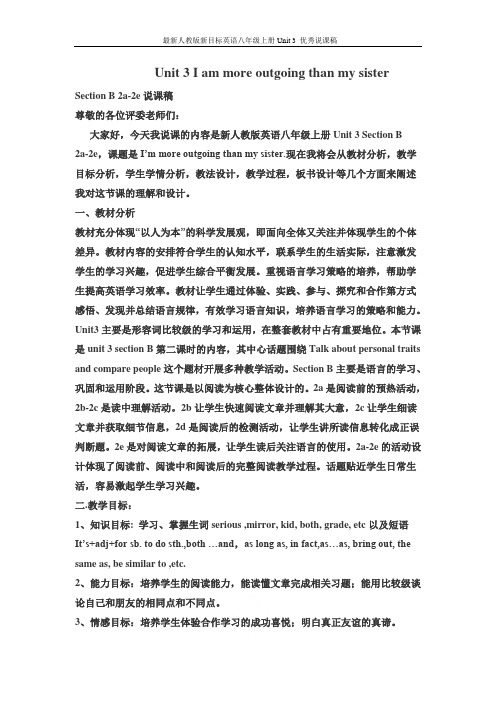
Unit 3 I am more outgoing than my sister Section B 2a-2e说课稿尊敬的各位评委老师们:大家好,今天我说课的内容是新人教版英语八年级上册Unit 3 Section B2a-2e,课题是I’m more outgoing than my sister.现在我将会从教材分析,教学目标分析,学生学情分析,教法设计,教学过程,板书设计等几个方面来阐述我对这节课的理解和设计。
一、教材分析教材充分体现“以人为本”的科学发展观,即面向全体又关注并体现学生的个体差异。
教材内容的安排符合学生的认知水平,联系学生的生活实际,注意激发学生的学习兴趣,促进学生综合平衡发展。
重视语言学习策略的培养,帮助学生提高英语学习效率。
教材让学生通过体验、实践、参与、探究和合作第方式感悟、发现并总结语言规律,有效学习语言知识,培养语言学习的策略和能力。
Unit3主要是形容词比较级的学习和运用,在整套教材中占有重要地位。
本节课是unit 3 section B第二课时的内容,其中心话题围绕Talk about personal traits and compare people这个题材开展多种教学活动。
Section B主要是语言的学习、巩固和运用阶段。
这节课是以阅读为核心整体设计的。
2a是阅读前的预热活动,2b-2c是读中理解活动。
2b让学生快速阅读文章并理解其大意,2c让学生细读文章并获取细节信息,2d是阅读后的检测活动,让学生讲所读信息转化成正误判断题。
2e是对阅读文章的拓展,让学生读后关注语言的使用。
2a-2e的活动设计体现了阅读前、阅读中和阅读后的完整阅读教学过程。
话题贴近学生日常生活,容易激起学生学习兴趣。
二.教学目标:1、知识目标: 学习、掌握生词serious ,mirror, kid, both, grade, etc以及短语It’s+adj+for sb. to do sth.,both …and,as long as, in fact,as…as, bring out, the same as, be similar to ,etc.2、能力目标:培养学生的阅读能力,能读懂文章完成相关习题;能用比较级谈论自己和朋友的相同点和不同点。
人教版八年级英语上册:Unit3-讲义(含答案).doc

学科:英语专题:Unit3 I'm more outgoing than my sister重难点精讲题一题面Tina is __________________than Tara.Tina比Tara更外向。
Lisa sang __________________ than Nelly.Lisa唱歌比Nelly更好。
请写出这些词的比较级quicker fatterfiner ugliermore interestingbetter强势比较This painting __________________________.这幅画比那幅要更贵。
He ____________________________.他比我工作更努力。
The air in Beijing is getting much ______ now than a few years ago.A.cleanB.cleanerC.cleanestD.the cleanestWe are glad to see that Shanghai is developing ______ these years than ever before.A.quicklyB.less quicklyC.more quicklyD.the most quicklyJim runs ______ than his brother.A.fastB.fasterC.fastestD.the fastestThe…,the… 结构The older I get, the happier I am.The more exciting it is, the more I like it.题二题面The ____________, the ____________. 越早越好。
比较级+and+比较级The weather is getting colder and colder.She felt herself becoming more and more nervous.I began to feel ___________________. (越来越健康)程度副词修饰比较级She’s a little more outgoing than me.Is your mother any more relaxed?You’ve got far more (much more) opportunities than I have.After taking the medicine, he did not get any better.I’m feeling __________________. (好多了)题三题面Tara works as ____________ as Tina. (hard)Are you as ____________ as your sister? (friendly)同级比较This painting is _______________________ that one.这幅画与那幅同样贵。
新目标人教版初二英语上unit3说课稿(sectionA1a-1c)

Oral Presentation of the T eaching Plan forLesson 1, Unit 3, GO FOR IT Book 2AI. Teaching Material AnalysisThis is the first lesson of 3rd unit in GO FOR IT Book 2a, and the topic is “What are you doing for vacation?”The contents are: word study, speaking, oral practice and presentation. Such a topic is related to our daily life, so it is easy to arouse the Ss‟learning interests and it will be also helpful to improve their spoken English.While I‟m teaching, I‟m also calling their imaging of holidays. What‟s more, it arouses their desires for traveling. By means of group work, I can make them understand the importance of cooperation. Therefore this lesson is in the important position of the teaching material.II. Teaching Objectives1. Language Objectives(1) To make the students know the important words, such as vacation, plan,fishing…(2) To make the students know the important phrases, such asTake a vacation, get back, go sightseeing…Sentence patterns, such asWhat are you doing for vacation?2. Abilities Objectives(1) To develop the Ss‟ abilities of listening, speaking, reading.(2) To train the Ss‟ abilities of cooperation.(3) To develop Ss‟ abilities of communication by learning useful sentence patterns.3. Moral Objectives(1) To enable students know vacation release the pressure of study.(2) To enable students know vacation brings us much pleasure.III. Important pointsThe teaching important and difficult points‟ basis is established according to lesson one in the teaching material‟s position and function.(1) Help students communicate with each other properly.(2) Enable students study in groups and cooperate skillfully.IV.Difficult Points(1) Help students talk with others with newly-learned words and sentence patterns forvacation plans.(2) Help students how to make a vacation plan.V.Teaching Methods(1)The main teaching methods include: Task-based language teaching, activity-basedteaching (individual work, pair work, group work…)According to the teaching material analysis above and the New National English, curricular, I‟ll use explanation to teach the dialogue. In order develop Ss‟communicative and cooperative skills and implement the important points, I‟ll adopt Activity-based teaching methods. To solve the difficult points, I‟ll adopt Task-based language teaching methods to teach them how to use the new words, phrases,sentence patterns.(2)Teaching Aids: Multi-media computer, PowerPoint, pictures, chalk, and blackboard. VI. Learning MethodsIn order to let Ss master more knowledge and promote Ss‟ intelligence, I‟ll teach Ss how to learn, rather than what to learn, so the first thing I should do is to help Ss pick up the skills of study and develop their interests. Second, I should try my best to let them open their mouth to speak. According to these above, I‟ll encourage Ss to use the following learning methods:(1)Picture reading discovery methods:Let the Ss to give the names of vacation activities according to looking at thepictures.(2) Summary methodLet the Ss to give the grammar rule according to the sentence patterns.(3) Communicative and cooperative methodsAsk the Ss to work in pairs and groups to practice their oral English andcommunicative and cooperative abilities.VII. Teaching ProceduresThere are eight steps in my teaching procedures.Step I GreetingsPurpose: Arouse the Ss‟ attentionStep II V ocabulary Learning (3mins)Purpose: Let students learn some new words and know the meaningsOf the wordsStep III Lead in, talk about vacation plans (The whole class, 2mins)First, I‟ll the Ss my vacation plans, then present the sentences on the Bb…What are you doing for vacation? I‟m traveling.‟ Second, I‟ll teach them andask them read following me, and then I will ask the Ss‟ vacation plans usingthe sentence patterns …what are you doing for vacation?‟Purpose: Activate the Ss to realize the topic of “What are you doing forvacation?” and create a relaxing atmosphere.Step IV New sentence patterns learning (12mins)(1) Ask students‟ vacation plans (work in chain)(2) Show some pictures to students and introduce them to students one byone (Let Ss to give grammar rules according the sentence, then write thesentence pattern on the Bb)(3)Show some pictures on screen. To let them imitate the sentence patterns tosay what they see in the pictures.Purpose: Let Ss master the sentence pattern (What are you doing forvacation?)Step V Do exercises in the textbook (16mins)(1)Ask Ss to speak out the names of vacation activities in the page1.activiry1a.The teacher writes the answers on the Bb and tells Ss to write them down.(2)Group work: write down their vacation plans in page2.(3) Read the conversation in the book, and then fill the chart in page3.(4)Make a conversation in the book, role play, and then exchange roles inpage3.Purpose: Let Ss know how to say the name of activities. Through the groupwork, cultivate their communication abilities and the spirit of cooperation.Train the ability of solves problems by themselves. In class, the teacher is justa guide, while the Ss are the center, offering help when they need. Get Ss learnmore useful words phrases and sentence patterns about vacation, such aspostcard, get back, Who are you going with?...Step VI Practice Work (8mins)(1)Make a survey, ask students to make their vacation plans and fill in thechart on the Bb.(2)Ask a student to read a note about vacation plans, and then ask the wholeclass some questions according to the note.Purpose: Let Ss know how to make a vacation plan. Check if they havemastered the sentence patterns, and overcome their shyness.Step VII Grammar Focus and Consolidation (2mins)Stress the important words and phrases on the Bb.Purpose: To let them know these sentence patterns are very important. Step VIII Summary and Homework (2mins)1. Summary: We have learned some important words, phrases, sentencepatterns, ask students if they can make vacation plans.2. Homework: (1) Make a survey. (2) Copy the new words. (3) Recite theconversation in page 3.Purpose: Consolidate the language points, and it is necessary for the Ss todo some extensive exercise after class to consolidate the knowledge theylearned.VIII. Blackboard DesignAs for my blackboard-design, I‟d like to give a brief introduction.It‟s divided into three parts. Title is in the top middle. Left part is important words and phrases. Middle part is important sentence patterns. Right part is homework.So much for my oral presentation, thank you! Bye-bye!Important, words and phrases, sentence patterns: V acation, camp, takes vacation……Unit 3What are you doing for vacation?I‟m traveling.Where are you going for vacation?How long are you staying there?I‟m staying for a week…Homeworka)make a surveyb)copy the newwords andsentence patternsc)recite theconversation。
人教版八年级英语上册说课稿《UNIT3Period1(SectionA1a-2c)》
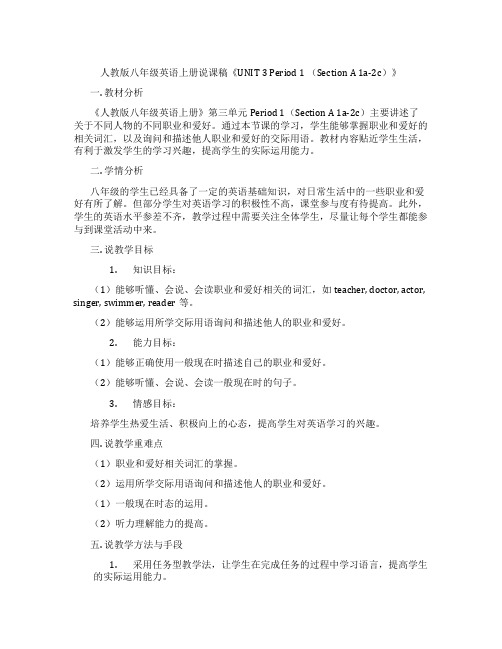
人教版八年级英语上册说课稿《UNIT 3 Period 1 (Section A 1a-2c)》一. 教材分析《人教版八年级英语上册》第三单元Period 1(Section A 1a-2c)主要讲述了关于不同人物的不同职业和爱好。
通过本节课的学习,学生能够掌握职业和爱好的相关词汇,以及询问和描述他人职业和爱好的交际用语。
教材内容贴近学生生活,有利于激发学生的学习兴趣,提高学生的实际运用能力。
二. 学情分析八年级的学生已经具备了一定的英语基础知识,对日常生活中的一些职业和爱好有所了解。
但部分学生对英语学习的积极性不高,课堂参与度有待提高。
此外,学生的英语水平参差不齐,教学过程中需要关注全体学生,尽量让每个学生都能参与到课堂活动中来。
三. 说教学目标1.知识目标:(1)能够听懂、会说、会读职业和爱好相关的词汇,如teacher, doctor, actor, singer, swimmer, reader等。
(2)能够运用所学交际用语询问和描述他人的职业和爱好。
2.能力目标:(1)能够正确使用一般现在时描述自己的职业和爱好。
(2)能够听懂、会说、会读一般现在时的句子。
3.情感目标:培养学生热爱生活、积极向上的心态,提高学生对英语学习的兴趣。
四. 说教学重难点(1)职业和爱好相关词汇的掌握。
(2)运用所学交际用语询问和描述他人的职业和爱好。
(1)一般现在时态的运用。
(2)听力理解能力的提高。
五. 说教学方法与手段1.采用任务型教学法,让学生在完成任务的过程中学习语言,提高学生的实际运用能力。
2.运用多媒体教学手段,如图片、视频等,丰富教学内容,激发学生的学习兴趣。
3.采用分组合作学习,提高学生的团队协作能力,使课堂更加生动有趣。
4.注重个体差异,因材施教,让每个学生都能在课堂上得到锻炼和提高。
六. 说教学过程利用图片展示不同职业的人物,引导学生谈论他们的职业,为新课的学习做好铺垫。
2.新课呈现:(1)展示1a图片,让学生观察并说出图中人物的职业。
英语:Unit 3讲学稿(人教新目标八年级上)

英语:Unit 3讲学稿(人教新目标八年级上)一.想想译译babysit my sister go camping visit my grandmother夏令营在家看电视What are you doing for vacation? I’m relaxingathome .how long___________ 西藏_________ 香港______向远处;离开__________ 发送;寄_________名信片_________ Hawaii_________How long are you staying?I’m staying for four days.听起来有趣_________ 玩得高兴________仅4天_____________去徒步旅行____________看望我的朋友____________寄给我一张香港的名信片____________________返回学校_____________________给我看一下你的照片____________二.合作探究:语法:现在进行时表What are you doing for vacation?I’m babysitting my sister.What are they doing for vacation?They’re relaxing at home.上面句子使用的时态是___________,现在进行时表示_____________的动作。
常与now,______和_____等连用。
它的结构是:______________.而本单元主要学习用现在进行时表示__ 的动作,常与将来的时间状语连用。
如:next Sunday ,_________ _________ 等。
3.go camping 去野营,动词go+v-ing 构成去购物_______去钓鱼_________去游泳_________4.That sounds nice.听起来不错。
人教版八年级英语上册Unit3SectionB2a2e说课稿

为了激发学生的学习兴趣和动机,我将采取以下策略或活动:
1.创设情境:设计有趣的情境,让学生在真实语境中运用所学知识,提高他们的学习兴趣;
2.小组合作:组织学生进行小组讨论和实践活动,培养学生的团队协作能力和竞争意识;
3.课堂互动:增加课堂提问和互动环节,鼓励学生积极参与,提高他们的自信心;
人教版八年级英语上册Unit3SectionB2a2e说课稿
一、教材分析
(一)内容概述
本节课为人教版八年级英语上册Unit 3 Section B 2a-2e的内容。在这个课程体系中,本节课位于单元的第三部分,即深入拓展和实践运用阶段。在前两部分,学生已经学习了描述人物外貌和性格的词汇,以及一般现在时态的用法。本节课的主要内容是继续深入学习一般现在时态,并通过阅读实践活动,让学生掌握如何描述人物的习惯和行为。
5.对学生的学习情况进行实时反馈,针对问题进行个别指导。
(三)巩固练习
为了帮助学生巩固所学知识并提升应用能力,我计划设计以下巩固练习或实践活动:
1.小组活动:让学生分组编写一段关于描述人物日常习惯的对话,并进行展示;
2.个人练习:让学生用一般现在时态描述一个熟悉的朋友或家人的习惯,进行口头报告;
3.阅读练习:提供相关主题的阅读材料,让学生完成练习题,巩固阅读技巧;
为应对这些问题,我将:
1.在课堂上增加即时反馈,及时发现并纠正学生的错误;
2.设计更具吸引力的互动活动,鼓励所有学生参与;
3.灵活调整教学进度,确保每个环节都有足够的时间进行深入探讨。
课后,我将通过以下方式评估教学效果:
1.收集和分析学生的作业,检查知识掌握情况;
2.课后访谈,了解学生的课堂体验和意见;
(五)作业布置
人教版初中英语说课稿模板八上unit3
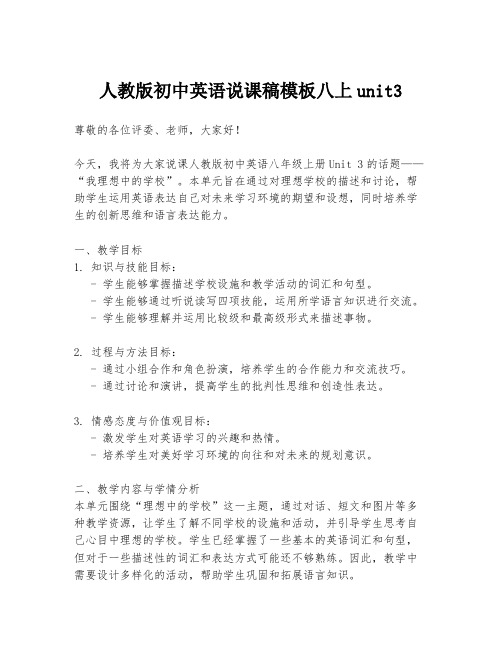
人教版初中英语说课稿模板八上unit3尊敬的各位评委、老师,大家好!今天,我将为大家说课人教版初中英语八年级上册Unit 3的话题——“我理想中的学校”。
本单元旨在通过对理想学校的描述和讨论,帮助学生运用英语表达自己对未来学习环境的期望和设想,同时培养学生的创新思维和语言表达能力。
一、教学目标1. 知识与技能目标:- 学生能够掌握描述学校设施和教学活动的词汇和句型。
- 学生能够通过听说读写四项技能,运用所学语言知识进行交流。
- 学生能够理解并运用比较级和最高级形式来描述事物。
2. 过程与方法目标:- 通过小组合作和角色扮演,培养学生的合作能力和交流技巧。
- 通过讨论和演讲,提高学生的批判性思维和创造性表达。
3. 情感态度与价值观目标:- 激发学生对英语学习的兴趣和热情。
- 培养学生对美好学习环境的向往和对未来的规划意识。
二、教学内容与学情分析本单元围绕“理想中的学校”这一主题,通过对话、短文和图片等多种教学资源,让学生了解不同学校的设施和活动,并引导学生思考自己心目中理想的学校。
学生已经掌握了一些基本的英语词汇和句型,但对于一些描述性的词汇和表达方式可能还不够熟练。
因此,教学中需要设计多样化的活动,帮助学生巩固和拓展语言知识。
三、教学重点与难点1. 教学重点:- 掌握描述学校设施和活动的词汇。
- 学会使用比较级和最高级形式进行描述。
2. 教学难点:- 运用所学语言知识,流利地表达自己对理想学校的设想。
- 在口语表达中正确运用比较级和最高级。
四、教学方法与手段1. 教学方法:- 采用任务型教学法,通过实际情境模拟,让学生在完成任务的过程中学习和使用英语。
- 利用多媒体教学资源,如图片、视频等,增强学生的视觉感受,提高学习兴趣。
2. 教学手段:- 使用PPT展示理想学校的图片和描述,激发学生的想象力。
- 通过小组讨论和角色扮演,让学生在互动中练习语言技能。
五、教学过程1. 导入新课:- 通过展示不同学校的图片,引导学生谈论自己现在的学校,并过渡到理想学校的讨论。
人教新目标版八年级英语上册Unit3(SectionA2d3c)说课稿

(一)板书设计
我的板书设计将注重布局的合理性、内容的精炼性和风格的简洁性。板书将包括一般过去时的被动语态的构成、用法和示例。在教学过程中的作用是辅助学生理解和记忆知识点,提供清晰的视觉辅助工具。为确保板书清晰、简洁且有助于学生把握知识结构,我会使用大号字体和清晰的书写,突出重点内容,并使用图示和颜色编码来辅助说明。
(三)学习动机
为了激发学生的学习兴趣和动机,我将采取以下策略或活动:首先,通过引入有趣的故事或情景,引发学生的好奇心,使他们产生学习的一般过去时被动语态的欲望。其次,设计富有挑战性的练习和活动,让学生在实践中运用所学的知识,增强他们的成就感。此外,我还将会鼓励学生互相交流和合作,激发他们的竞争意识,从而提高他们的学习积极性。最后,我会及时给予学生反馈和表扬,让他们感受到自己的进步和成长,进一步激发他们的学习动力。
人教新目标版八年级英语上册Unit3(SectionA2d3c)说课稿
一、教材分析
(一)内容概述
人教新目标版八年级英语上册Unit3(SectionA2d3c)的主要内容是学习关于一般过去时的被动语态。在整个课程体系中,这一单元处于第二册的第三单元,是学习英语基本时态和语态的重要部分。主要知识点包括一般过去时的被动语态的构成、用法和构成,以及如何运用一般过去时的被动语态进行日常交流。
(三)教学重难点
1.教学重点:一般过去时的被动语态的构成和用法。学生需要理解并能够熟练运用一般过去时的被动语态进行交流。
2.教学难点:一般过去时的被动语态的运用。学生需要能够在适当的语境中正确运用一般过去时的被动语态,并能够灵活地进行表达。
二、学情分析导
(一)学生特点
本节课面向的是八年级的学生,他们通常年龄在13到15岁之间。这个年龄阶段的学生正处于青春期,好奇心强,求知欲旺盛。他们的认知水平已经有了很大的提升,能够理解和掌握较为复杂的语法知识。在学习兴趣方面,大部分学生对英语保持着积极的态度,尤其是对英语口语和听力感兴趣。然而,在学习习惯方面,部分学生可能存在拖延、不够自律的问题。
人教版英语八年级上册Unit3SectionAGrammarFocus3c说课稿

在设计师生互动和生生互动环节时,我计划采取以下措施:
1.师生互动:通过提问、邀请学生上台演示、组织小组竞赛等形式,鼓励学生积极参与课堂。同时,及时给予学生反馈,引导他们正确理解和运用所学知识。
2.生生互动:组织小组讨论、角色扮演等活动,让学生在合作中交流、学习。鼓励学生互相评价、互相鼓励,培养他们的团队协作能力和沟通能力。
板书的风格将采用图文结合的方式,使用不同颜色的粉笔突出重点,如用红色标注关键词汇,蓝色书写示例句子,以增强视觉效果。板书在教学过程中的作用主要有:一是帮助学生梳理知识结构,强化记忆;二是引导学生的注意力,突出教学重点;三是记录教学过程中的关键信息,便于学生回顾。
为确保板书清晰、简洁,我将采取以下措施:一是提前设计好板书的框架,避免随意添加;二是在书写过程中,注重排版,保持字迹工整;三是在适当位置留白,以便记录学生的思考和回答。
(二)教学目标
知识与技能目标:学生能够掌握并运用形容词比较级来描述人物特征,掌握“than”的用法,并能够运用目标句型进行人物比较。
过程与方法目标:通过小组合作、情景对话等形式,培养学生的听说能力和团队合作意识,提高他运用英语进行实际交际的能力。
情感态度与价值观目标:激发学生对英语学习的兴趣,培养他们积极向上的情感态度,让他们在学习过程中体验到成功的喜悦,增强自信心。
1.首先,通过PPT展示形容词比较级的结构,解释其用法,并给出示例。
2.其次,结合具体的人物图片,引导学生用形容词比较级进行描述,让学生在实际语境中感受其用法。
3.再次,讲解“than”的用法,并通过示例句子和练习题,帮助学生巩固这一知识点。
4.最后,组织学生进行小组讨论,让学生互相交流所学知识,加深对形容词比较级的理解。
八年级英语上册-人教版-Unit 3 说课稿(2)

八年级英语上册-人教版-Unit 3 说课稿(2)一. 教材分析人教版八年级英语上册Unit 3的主题是“How do you get to school?”,主要让学生掌握一般疑问句的构成及其回答方式,同时学习与日常生活相关的交通工具和地点的词汇。
通过对教材的分析,我们可以发现,本单元的教学内容紧密联系学生的实际生活,有利于激发学生的学习兴趣和积极性。
二. 学情分析根据我对学生的了解,他们在七年级已经学习了简单的日常英语交际,对本单元的主题有一定的认识。
但部分学生对一般疑问句的构成和回答方式还不够熟练,同时他们的词汇量和语法知识也需要进一步拓展。
因此,在教学过程中,我需要关注学生的个体差异,因材施教。
三. 说教学目标1.知识目标:让学生掌握一般疑问句的构成及其回答方式,学会使用本课中的交通工具和地点词汇进行日常英语交际。
2.能力目标:培养学生用英语询问和描述日常生活中的地点和交通方式的能力。
3.情感目标:激发学生学习英语的兴趣,培养他们积极向上的学习态度。
四. 说教学重难点1.重点:一般疑问句的构成及其回答方式,本课中的交通工具和地点词汇。
2.难点:一般疑问句在实际交际中的应用,以及词汇和语法知识的拓展。
五. 说教学方法与手段1.教学方法:采用任务型教学法,让学生在完成实际任务的过程中学习和运用英语。
2.教学手段:利用多媒体课件、图片、地图等教学资源,以及课堂互动、小组讨论等教学活动。
六. 说教学过程1.导入:以学生日常上学交通工具为主题,引导学生谈论各自的交通方式,为新课学习做好铺垫。
2.呈现:通过展示一张学校的地图,引导学生找出学校附近的交通地点,同时板书关键词汇。
3.practice:让学生两人一组,用一般疑问句询问对方的交通方式,并回答。
4.扩展:通过小组讨论,让学生思考其他可能的交通方式,丰富词汇和语法知识。
5.巩固:设计一个角色扮演活动,让学生模拟在机场或车站询问和描述交通方式的情景。
八年级英语上册-人教版-Unit 3 说课稿(1)

八年级英语上册-人教版-Unit 3 说课稿(1)一. 教材分析人教版八年级英语上册Unit 3的主题是“My hero”,通过介绍英雄人物,让学生学会表达人物的特征、外貌、喜好等。
本单元的词汇和句子结构较为复杂,学生需要掌握一些形容词和副词来描述人物。
此外,本单元还涉及到了过去进行时态的用法。
二. 学情分析八年级的学生已经掌握了英语学习的基本语法和词汇,但部分学生在口语表达和写作方面还存在困难。
针对这一情况,教师在教学过程中要注重培养学生的口语表达能力和写作能力,同时激发学生的学习兴趣。
三. 说教学目标1.知识目标:学生能够掌握本课的生词、短语和句型,学会用英语描述人物的外貌、特征和喜好。
2.能力目标:学生能够运用所学知识进行口语交流和写作,提高英语实际运用能力。
3.情感目标:通过学习本单元,学生能够激发对英雄人物的敬仰之情,培养正确的价值观。
四. 说教学重难点1.重点:本课的生词、短语和句型。
2.难点:过去进行时态的用法以及如何用英语描述人物的外貌、特征和喜好。
五. 说教学方法与手段1.采用任务型教学法,让学生在完成任务的过程中运用所学知识。
2.运用多媒体教学手段,如图片、视频等,直观地展示人物形象,激发学生的学习兴趣。
3.小组讨论,鼓励学生积极参与,提高口语表达能力。
4.注重个体差异,给予学生个性化的指导和反馈。
六. 说教学过程1.导入:展示一些英雄人物的照片,让学生猜测并介绍这些人物。
2.新课呈现:通过图片和视频,展示本课的生词、短语和句型。
3.学生讨论:分组讨论,用英语描述自己喜欢的英雄人物。
4.口语练习:学生模拟介绍英雄人物,其他学生进行评价。
5.写作练习:让学生写一篇关于自己喜欢的英雄人物的短文。
6.课堂小结:总结本课所学内容,强调重点。
7.作业布置:让学生完成课后练习,巩固所学知识。
七. 说板书设计板书设计要简洁明了,突出本课的重点。
可以设计如下板书:Unit 3 My hero1.生词:hero, brave, kind, smart, doctor, nurse, artist, musician, athlete,champion2.短语:be famous for, have a good sense of humor, be strict with, workhard3.句型:How would you describe a hero?What does he/she look like?What does he/she like to do?八. 说教学评价1.口语评价:评价学生在课堂上的口语表达能力和参与程度。
人教版英语八年级上册Unit 3说课稿

初二英语上册人教版新目标英语说课稿Unit3What are you doing for vacation?宋华林宁阳二十四中学初二英语上册人教版新目标英语说课稿Unit 3 What are you doing for vacation?一、教材分析本单元是Go for it八年级上册中第三单元“What are you doing for vacation?”。
本单元的核心话题是谈论未来计划,课文始终围绕这一主题展开,我们要学习如何谈论假期的计划(Vacation plans),及对将来的安排(Future plans)。
本课时让学生学会用what询问将来的假期活动并回答;用when, who,等词围绕未来计划进行提问和回答。
语言知识和语言技能部分主要是围绕核心话题设计安排了许多听,说,读,写的任务活动,以及有不断丰富巩固这一话题的词汇及习惯短语。
我将灵活运用这些活动,并将其中的一些活动进行变化或整合。
二.教学目标:1.知识与能力目标:(1).语言知识目标:通过学习让学生识记并熟练掌握本节课单词、短语及句型:babysit, camp, hike, ride, sightseeing, fish, rent, spend time with friends,What are you doing for vacation? /When are you going? / Who are you going with?(2)语言技能目标:能熟练运用所学词汇、句型讨论将来计划。
2. 过程与方法:通过大量的Pairwork, Guessing game, Listening, Groupwork活动,培养学生自主学习的能力、语言综合运用能力、听力、英语会话能力和与他人合作的能力。
3、情感态度与价值观目标:通过What are you doing for vacation?这个话题的谈论,从而让学生从现在就学会为将来的事情做准备,对将来的事情做好计划,为之向往,从小就有一个积极向上的人生观和世界观,以及对未知世界的求知欲。
- 1、下载文档前请自行甄别文档内容的完整性,平台不提供额外的编辑、内容补充、找答案等附加服务。
- 2、"仅部分预览"的文档,不可在线预览部分如存在完整性等问题,可反馈申请退款(可完整预览的文档不适用该条件!)。
- 3、如文档侵犯您的权益,请联系客服反馈,我们会尽快为您处理(人工客服工作时间:9:00-18:30)。
Unit 3 What are you doing for vacation?(Period 1)课型:新授主备:陈宝娟审核:班级:姓名:时间:学习目标:1.讨论未来计划;2.进行时态表示计划或安排将要发生的动作.课前准备:1.识记本课新单词;2.预习并完成1a.3.翻译并熟记下列短语:去游泳去钓鱼多长时间去野营 on Monday next week4.讨论预习中存在的问题.课前检测:1.用适当的形式填空:1) Are you (go) for a trip to the seaside?2) The shoes are too dirty, I’m going to (清洗) them.3) (get) up or we’ll be late for class.4) They are going to do some (shop).疑难摘录__________________________________________________________________________ ___________________________________________________学习过程:1.师生交流,探究预习中存在的问题.2.找出本节课的重要句型:3.听录音,完成1b,2a和2b.4.读下列对话,探讨并总结:-What are you doing for vacation? -I’m visiting my grandmother.-When are you going? -I’m going on Monday.上述句子都是时态,其结构为,由部分构成,谈论计划.5.双人进行下列对话练习,并编写新对话.A: What are you doing for vacation?B: I’m going camping.A: That sounds nice. Who are you going with?B: I’m going with my parents.A:B:A:B:课堂检测:1.按要求变换下列单词:visit(名词) shop(现在分词) it(复数)family(复数) hear(同音词) mine(主格)five(序数词) a re not(缩写)2.根据答语,补充问句:1) for vacation?We’re going swimming.2) for vacation?She’s visiting her grandparents.3) ?He’s going on September 10th.4) ?They are going home next week.5) ?I’m going camping with my friends.3.连词成句1)do ,on , you, what, weekends, usually, do, ?__________________________________________________2) often, Cheng, TV, how, does , watch, ?____________________________________________________3)matter, you , what, is, the, with?_____________________________________________________ 错题集____________________________________________________________________ _________________________________________ ________________(学)教后记____________________________________________________________________ _________________________________________________________Unit 3 What are you doing for vacation?(Period 2)课型:新授主备:陈宝娟审核:班级:姓名:时间:学习目标:1.复习正在进行时态并正确运用;2.识记本课重要单词和短语:课前准备:1.复习现在进行时态;2.预习3a,并完成数据.课前检测:根据句意及汉语提示完成句子.1) Linda is (临时照顾) her little brother.2) The boys went (野营) last year.3) What are you doing for (假期).4) Hong Kong (回归) to China in 1997.5) How about (去散步)?疑难摘录__________________________________________________________________________ ___________________________________________________教学过程:1.师生共同探究预习中存在的问题.2.双人分角色练习对话3a,3b.其中:(1) I’m going hiking in the mountains. 我要去山里远足. go hiking “去远足”,“go+动词的-ing形式”,表示体育运动或娱乐消遣,类似的短语有:go fishing 去钓鱼go sightseeing去观光,游览go skating 去滑冰(2) That sounds nice. 那听起来很好. sound 在句中作连系动词,后面跟形容词、名词、介词短语作表语. 例如:The song sounds wonderful. 那首歌听起来美妙动听.That sounds a good idea. 那听起来是一个好主意.(3) How long is he staying? 他将待多久?how long 意为“多久,多长”,用来询问一段时间. 例如:还可用于询问物体的长度. 例如:How long is the ruler?课堂检测:1.单项填空:( ) 1. are you going for summer vacation?A. WhatB. WhenC. WhereD. How( ) 2. –Who are you going –My mother.A. toB. withC. forD. at( ) 3. He’s for Beijing next week.A. leaveB. to leaveC. leavesD. leaving( ) 4. You’d better a rest when you finish it.A. haveB. to haveC. havingD. had( ) 5. Would you like with us tomorrow?A. goB. to goC. goingD. went( ) 6. What is she doing vacation?A. inB. withC. atD. for( ) 7. We are going to Beijing July I7.A. inB. onC. atD. for( ) 8. –do you do sports every day?–About two hours.A. How longB. How oftenC. How muchD. How( ) 9. This music beautiful.A. listensB. hearsC. soundsD. are( ) 10. The tourists should take with them.A. something necessaryB. necessary somethingC. necessary everythingD. anything necessary2.句型转换.1.I’m going to stay in America for a year.(对画线部分提问)are you going to stay in America?2.How is the weather in Lanzhou?(同义句转换)is the weather in Lanzhou?3.I go to see the dentist twice a year.(对画线部分提问)do you go to see the dentist.4. When did you return from your vacation? (同义句)When did you from your vacation?5. She is babysitting her sister. (同义句转换)She is her sister.错题集____________________________________________________________________ _________________________________________ ________________(学)教后记_____________________________________________________________________Unit 3 What are you doing for vacation?(Period 3)课型:新授主备:陈宝娟审核:班级:姓名:时间:学习目标:1.学会制定度假计划,2.正确使用现在进行时表将来,.3.区别现在进行时表将来与be going to表将来,4. 重要词语:take a vacation / vacations, go camping, go fishing.课前准备:1.识记新单词;2.预习并完成section B 中的1a;3.预习2c,注意句子时态. 课前检测:单项选择:1. What are you this weekend?A. doB. goingC. to do2. are you talking with?A. WhoB. who’sC. Whose3. His plan very interesting.A. looksB. soundsC. hears4. She is going to the classroom English books.A. to readB. readingC. reads5. I’ll write to you as soon as I to school.A. goB. goingC. to go疑难摘录__________________________________________________________________________ ___________________________________________________学习过程:1.预习情况交流,共同探讨存在的问题.2.听对话,完成2a,2b.3.读句子,探讨并总结:1) Ben Lambert, the famous French singer is taking a long vacation this summer. 法国著名歌星Ben Lambert在这个夏季要休一个长假.the famous French singer在这句话中作Ben Lambert的同位语,是对它的一个补充说明,对整个句子的时态没有任何影响. 例如:Zhang chaoyang, the CEO of Sohu Company, told the reporters yesterday that company would have a big change this year. 搜狐总裁张朝阳于昨日向记者发表声明,搜狐公司今年将有一个很大的转变.2) I hope I can forget all my problem. 我希望能忘记所有的烦恼.hope 作及物动词,表示“希望”,其后可跟不定式作宾语. 例如:I hope to see you soon;若要表示“希望别人做某事”,则后需跟宾语从句. 例如:I hope that you have a good time.forget用于forget to do sth. 中,表示“忘记要做某事”,但forget doing sth表示“忘记做过了某事”. 例如:I forget to post the letter. (忘了要把信寄出) I forget posting the letter. (忘了把信寄出了)课堂检测:1.补全对话。
